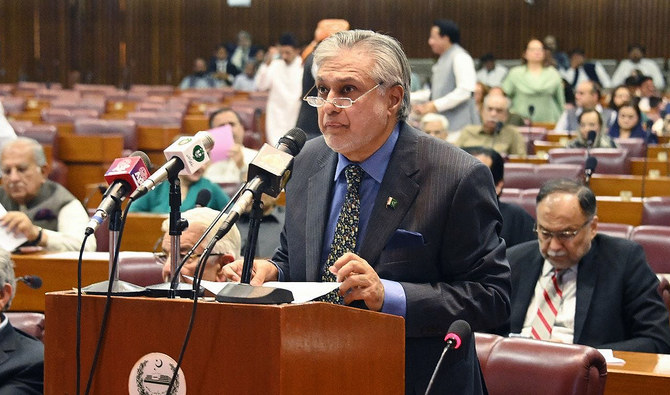ISLAMABAD: The United Arab Emirates has confirmed financial support of $1 billion to Pakistan, the South Asian nation’s finance minister said on Friday, removing a key hurdle to securing a much-awaited bailout tranche from the International Monetary Fund (IMF).
The commitment is one of the IMF’s last requirements before approving a staff-level pact to release a tranche of $1.1 billion, delayed for months, that is crucial for Pakistan to resolve an acute balance of payments crisis.
“The State Bank of Pakistan is now engaged for needful documentation for taking the said deposit from UAE authorities,” Finance Minister Ishaq Dar said on Twitter, referring to the central bank.
The pledge makes the UAE the third country, after Saudi Arabia and longtime ally China, to come to Pakistan’s assistance, as external financing is needed to fully fund the balance of payments gap for the fiscal year that ends in June.
“The UAE deal should be helpful because the IMF has been saying Pakistan should secure financing from ‘friendly’ nations,” said Seaport Global EM credit analyst Himanshu Porwal.
“It is still far from over though. The IMF is saying that they (Pakistan) are in breach of certain targets. The fiscal deficit for example is seen peaking at around 8.3 percent (of GDP), so almost double what they were expecting,” he added.
Pakistan’s bonds, which have slumped nearly 70 percent over the last year as the country’s troubles have mounted, climbed for a second day running on the confirmation. The rise was almost 5 percent for its bond with closest payment date – April 15 next year – taking it to almost 50 cents in the dollar, compared to 46 cents a few days ago.
On Thursday, the IMF’s managing director, Kristalina Georgieva, said the fund was also in talks with nations friendly to Pakistan to secure financial assurances vital for the program.
Last week, Saudi Arabia also told the IMF it would provide financing of $2 billion to Pakistan.
Pakistan’s foreign exchange reserves have fallen to cover barely a month of imports after the IMF funding stalled in November, hit by snags over fiscal policy adjustments after officials of the lender visited Islamabad in February for talks.
They formed part of a ninth review exercise on a bailout package of $6.5 billion agreed in 2019 whose resumption is critical for Pakistan to avoid risking default on external payment obligations.
POLICY AND FISCAL MEASURES
Pakistan had to complete actions demanded by the IMF, such as reversing subsidies in its power, export and farming sectors, hikes in the prices of energy and fuel, and a permanent power surcharge, among other measures.
These steps included jacking up its key policy rate to an all-time high of 21 percent, a market-based exchange rate, arranging for the external financing, and raising more than 170 billion rupees ($613 million) in new taxes.
The fiscal adjustments have already fueled Pakistan’s highest inflation ever, which climbed in March to more than 35 percent on the year.
A final issue to be resolved is a fuel pricing scheme meant to bring relief to Pakistan’s lower middle class and poor from crippling inflation. The IMF has asked how it will be funded.
The IMF program will disburse another tranche of $1.4 billion to Pakistan before it concludes in June.
Funds from the lender will also unlock other bilateral and multilateral financing for the cash-strapped country.
Neighboring China has rolled over $2 billion and refinanced another $1.3 billion in recent weeks.
On Friday, Pakistan’s central bank is set to receive a third and final disbursement of $300 million from the refinancing by the Industrial and Commercial Bank of China, Dar added.
Program loans from other multilateral agencies await completion of the IMF review, central bank governor Jameel Ahmad told investors in Washington at the spring meetings of the lender and the World Bank.
Measures such as a hike of 1,400 basis points in interest rates over the last 18 months have put the nation of 220 million on a path to macroeconomic stability, added Ahmad, who hoped for inflation to start decelerating over the next few months.
The government is pursuing a contractionary fiscal policy, with the primary balance in surplus so far compared to a deficit last year, he added.
Pakistan gets closer to IMF deal after UAE pledges $1 billion
https://arab.news/bjxhh
Pakistan gets closer to IMF deal after UAE pledges $1 billion

- The country’s dollar-denominated government bonds firm after the cash pledge by the Arab country
- Last week, Saudi Arabia also told the global lender it would provide $2 billion in financing to Pakistan
Kashmiris fortify bunkers, bracing for clashes between Pakistan and India

- 1.5 million residents live along de facto border, relying on bunkers and homemade shelters to weather perennial bouts of unrest
- India says its army has been exchanging fire with Pakistani military for the past five days as both countries remain on edge
CHAKOTHI, Pakistan: Pulling logs and dusty building materials from a storage bunker outside his home in Kashmir, Riaz Awan readied the underground space to house his family as they braced for clashes between Pakistan and India to reach their border village.
Kashmiris living on both sides of the de facto border — the Line of Control — have been caught in the barrage of shells and bullets for decades as the nuclear-armed archrivals fight over the disputed region.
The long history of clashes has pushed many residents to build bunkers for shelter should their homes be caught in the crossfire.
“We’ve endured cross-border firing, which has been a tough experience, and we don’t want our children to go through the same,” Awan, a 51-year-old farmer, told AFP as he and his children cleared the bunker that had until recently stored straw.
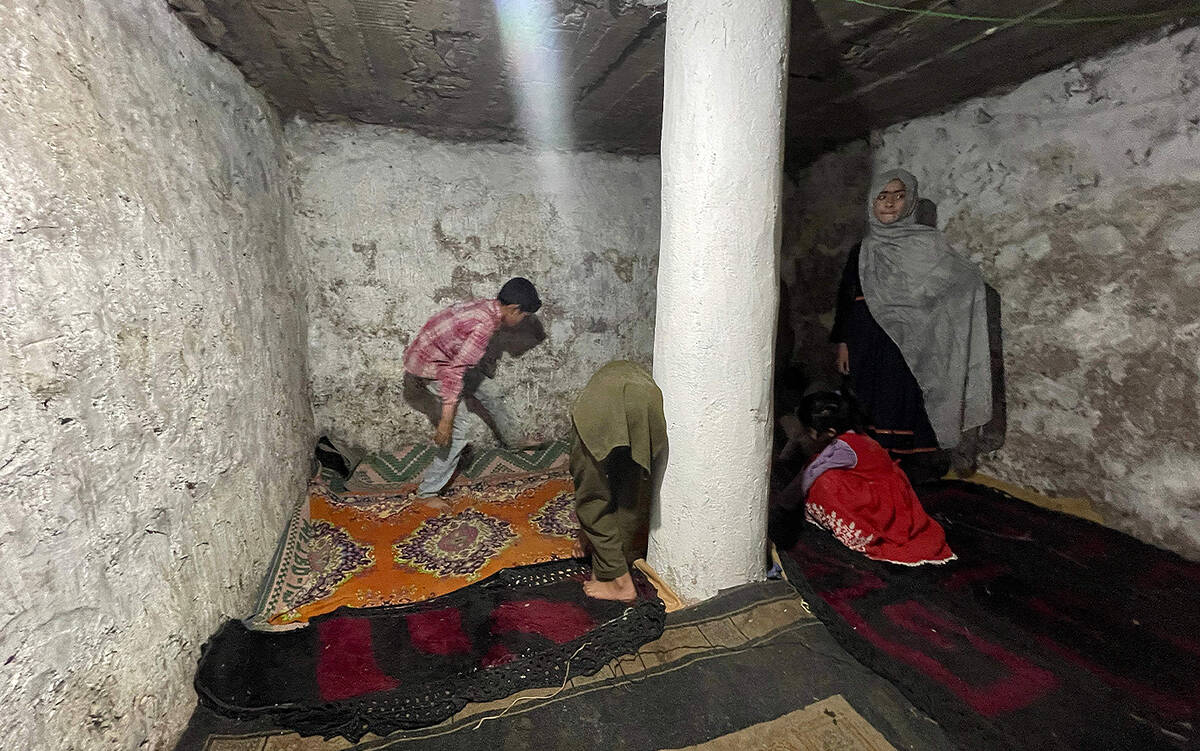
In Chakothi village, around three kilometers (two miles) from the Line of Control, there are around 30 bunkers for a community of 60 families overlooked by Indian army check posts atop the surrounding green mountains.
Awan and his cousin Shabbir share the bunker they built in 2017, which cost them 300,000 Pakistani rupees ($1,000) — a substantial amount in their impoverished village.
But they pulled together the funds to pay for safety.
A militant attack last week killed 26 people in Indian-administrated Kashmir, the worst attack on civilians in a Muslim-majority region in a quarter of a century.
India blamed the attack on Pakistan and accused it of “cross-border terrorism,” a charge Islamabad vehemently denied.
In response, New Delhi and Islamabad downgraded diplomatic ties, withdrew visas and announced the closure of the main land border. India has also suspended the 1960 Indus Waters Treaty that governs the sharing of river water between the two nations.
India says that its army has been exchanging fire with the Pakistani army for the past five days as both countries remain on edge, bracing for a potential military confrontation.
“Every day, India makes various threats, saying they will do this and that,” said 52-year-old retired soldier Shabbir Awan.
“That is why we are cleaning these bunkers today, so that if needed, we can use them and make our lives safer.”
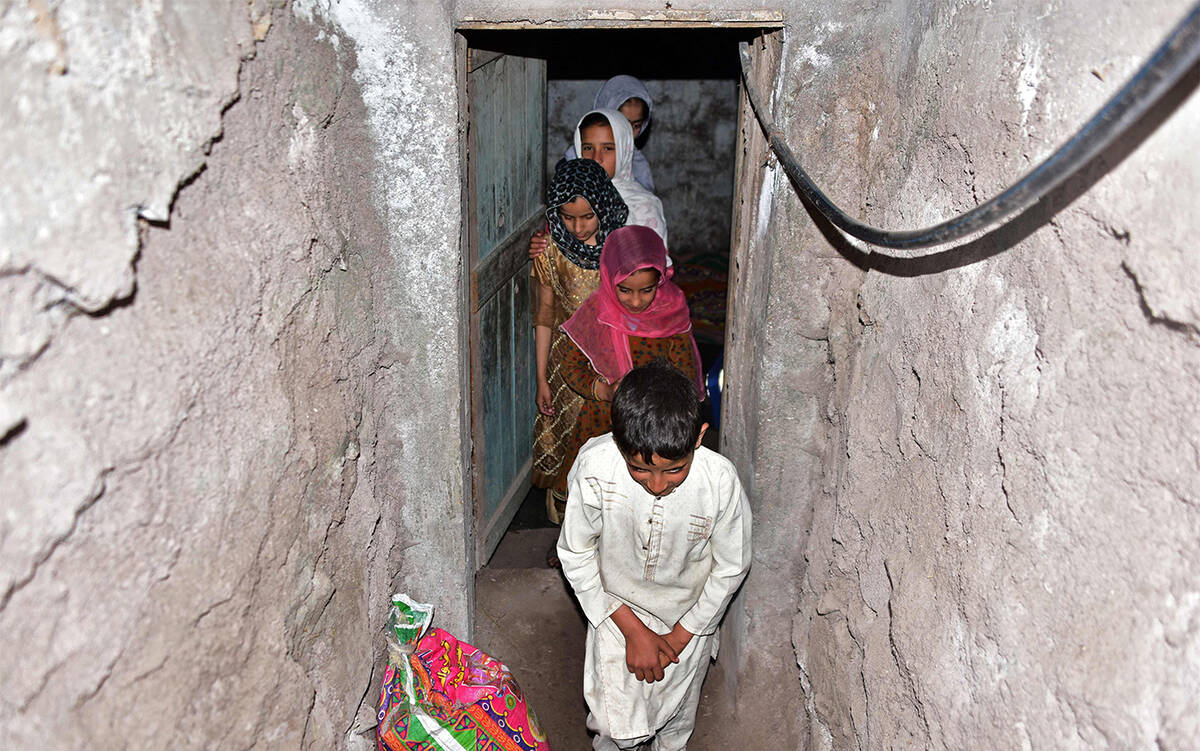
“NO PROPER SHELTER”
Kashmir has been divided between India and Pakistan since their independence from British rule in 1947. Both claim the territory in full but govern separate portions of it.
Rebel groups have waged an insurgency in Indian-controlled Kashmir since 1989, demanding independence or a merger with Pakistan
Ridges and valleys intersected by the Line of Control host tens of thousands of heavily armed troops, with some rival outposts just a few dozen meters apart.
The Pakistan military says about 1.5 million residents live along the ceasefire line, long relying on a network of community bunkers and homemade shelters to weather the perennial bouts of unrest.
An average underground bunker is around 2.5 meters deep, 3.5 meters wide and 3.5 meters long. Those who can afford it reinforce all four sides with concrete, while others simply use mud walls.
“Our main concern is the safety of our children, protecting them is our biggest priority,” said Saleema Bibi, a 40-year-old mother of four.
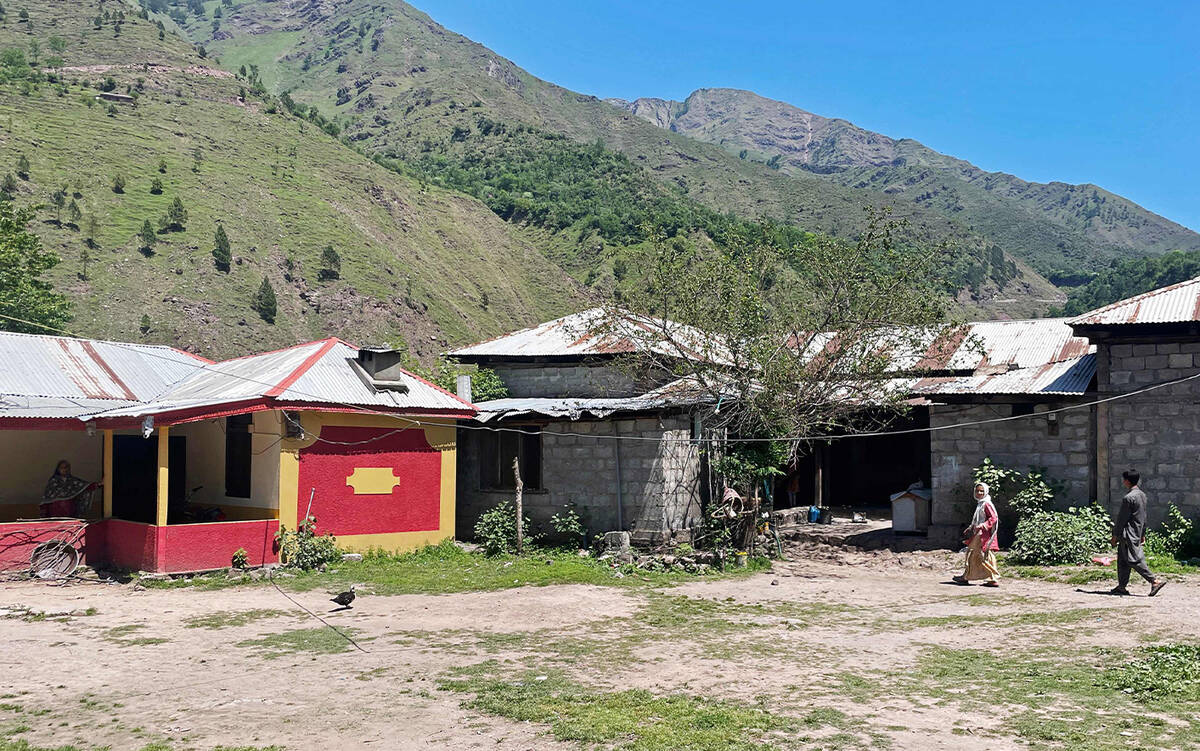
In 2017, “they even hit directly on top of our houses,” she told AFP.
“We have no proper shelter or protection. We are living here — where else can we go?” she said.
Naseema Bibi, a 46-year-old mother of four, owns a cow and two buffalos, making it hard for her to leave.
“We have livestock. We can’t move anywhere,” she said. So she is also working to clear a bunker.
“We are around eight families and it is difficult to adjust in one bunker,” she told AFP.
“But children get panicked so we are concerned because of them.”
Pakistan tells UN it has evidence ‘external adversaries’ behind deadly train hijacking last month

- A Pakistani diplomat at the UN extends condolences to the families of the victims of the Pahalgam attack
- He says the international community must support survivors of militant attacks without political selectivity
ISLAMABAD: Pakistan told the United Nations on Monday it had “credible evidence” that a deadly attack on a passenger train in its southwestern region last month was externally sponsored, as it called for stronger global efforts to hold perpetrators behind such incidents accountable.
The statement referred to the March hostage-taking on the Jaffer Express passenger train in Balochistan province, which lasted about 36 hours before security forces launched an operation that killed more than 30 militants from the separatist Baloch Liberation Army (BLA).
Pakistan’s decision to highlight the passenger train incident at the world body came at a time when tensions remain high in the region following the killing of 26 tourists in Indian-administered Kashmir last week, an attack India blamed on Pakistan, despite Islamabad’s categorical denial.
“Just last month, Pakistan suffered a heinous terrorist attack by the BLA on Jaffar Express passenger train, which included the taking of hostages in Pakistan’s Balochistan province, which resulted in the loss of at least 30 innocent Pakistani nationals,” Jawad Ajmal, Counsellor at Pakistan’s UN Mission, said at the launch of the Victims of Terrorism Association Network at the UN. “Pakistan has credible evidence that this attack had external sponsorship from our adversaries in the region.”
Ajmal stressed the international community must do more to support survivors of such militant attacks and the families of victims whose lives are permanently altered after such developments.
He urged a collective approach to prevent future attacks, emphasizing the need to hold militants and their backers accountable without political selectivity.
“If we are to chart a way forward for victims, we must look beyond narrow political interests and geopolitical agendas,” he said. “We must examine why, despite global strategies, terrorism threats continue to proliferate and give rise to an ever-increasing number of victims.”
Commenting on the recent attack in Pahalgam in Indian-administered Kashmir, Ajmal said Pakistan extended condolences to the families of the victims and wished a speedy recovery to the injured.
He noted that Pakistan joined other UN Security Council members in condemning the attack.
The Pakistani diplomat added that his country was one of the worst victims of militant violence over the past two decades and had lost more than 80,000 lives to it.
He paid tribute to the families of his country’s law enforcement and armed forces personnel who had made “countless sacrifices” to defend the nation.
Saudi official rejects ‘baseless’ reports Pakistani Hajj pilgrims’ funds sent to wrong account

- News reports claimed thousands of Pakistani pilgrims’ funds mistakenly sent to an account linked to OPEC
- Saudi official says Kingdom’s electronic Hajj platform ensures “highest standards of transparency and accuracy“
ISLAMABAD: An official at Saudi Arabia’s Ministry of Hajj and Umrah on Tuesday rejected reports that Hajj funds of thousands of Pakistani pilgrims had been transferred to the wrong bank account, reiterating that the Kingdom’s electronic Hajj system operated with the “highest standards of transparency.”
Local news outlets this month published reports that Pakistani pilgrims could face delays in the Hajj journey as millions of Saudi Riyals meant for their expenses were mistakenly sent to an account linked to the Organization of the Petroleum Exporting Countries (OPEC) instead of Saudi Arabia’s Ministry of Hajj.
This year’s annual pilgrimage will take place in June, with nearly 89,000 Pakistanis expected to travel to Saudi Arabia under the government scheme and 23,620 Pakistanis through private tour operators. The total quota granted to Pakistan was 179,210, which could not be met.
“Recent claims in some Pakistani media outlets about ‘Hajj funds being sent to the wrong Saudi account’ are baseless and stem from a misunderstanding of the Hajj account management system and the ministry’s official electronic Hajj platform, which ensures the highest standards of transparency and accuracy,” the Saudi official said in a statement.
Pakistani Prime Minister Shehbaz Sharif has formed a committee to investigate why the total Hajj quota granted by Saudi authorities to Pakistan could not be utilized, particularly by private tour operators.
The Saudi official said the Hajj ministry had announced arrangements for this year’s pilgrimage at the end of last year’s Hajj season, emphasizing the importance of adhering to timelines for finalizing contracts and services. In meetings with Pakistan’s religious affairs ministry and private Hajj companies, it was agreed that all contracts would be completed according to the approved schedule.
“While Pakistan’s Ministry of Religious Affairs successfully completed all its pilgrims’ contracts without any notable challenges, a number of Pakistani [private] companies failed to finalize their pilgrims’ contracts within the designated time frame,” the Saudi official said.
“This has been observed in past seasons as well and resulted in the inability to complete entry procedures for these pilgrims to perform Hajj in the Kingdom.”
The Saudi official said it is working in “high-level coordination” with Pakistani authorities to complete Hajj arrangements.
Pakistan kicked off its Hajj flight operations on Tuesday morning with the first batch of 442 pilgrims departing from Islamabad for Madinah.
Pakistan says shot down Indian ‘surveillance’ quadcopter near Kashmir border

- The incident comes a week after 26 tourists were killed in the Pahalgam area of Indian-administered Kashmir
- India blamed Pakistan, which denied involvement and warned of a ‘befitting response’ to any aggression
ISLAMABAD: Pakistan said on Tuesday it shot down an Indian quadcopter that violated its airspace along the Line of Control (LoC), the de facto border dividing the disputed region of Kashmir, amid growing tensions between the two nuclear-armed neighbors.
The incident comes a week after 26 tourists were killed in the Pahalgam area of Indian-administered Kashmir. India accused Pakistan of orchestrating the attack, though the charge was denied by Islamabad.
New Delhi also suspended key provisions of the 1960 Indus Waters Treaty, with Indian media outlets urging the government to consider military strikes.
Islamabad has warned it would deliver a “befitting response” to any aggression, saying its forces are on high alert to thwart any action from across the border.
“The Pakistan Army thwarted an Indian quadcopter’s violation of airspace along the Line of Control (LoC),” Pakistan’s government said on its official social media account.
“In the Manawar sector of Bhimber area, the enemy attempted to conduct surveillance using a quadcopter, which the Pakistan Army shot down through timely and effective action,” it added.
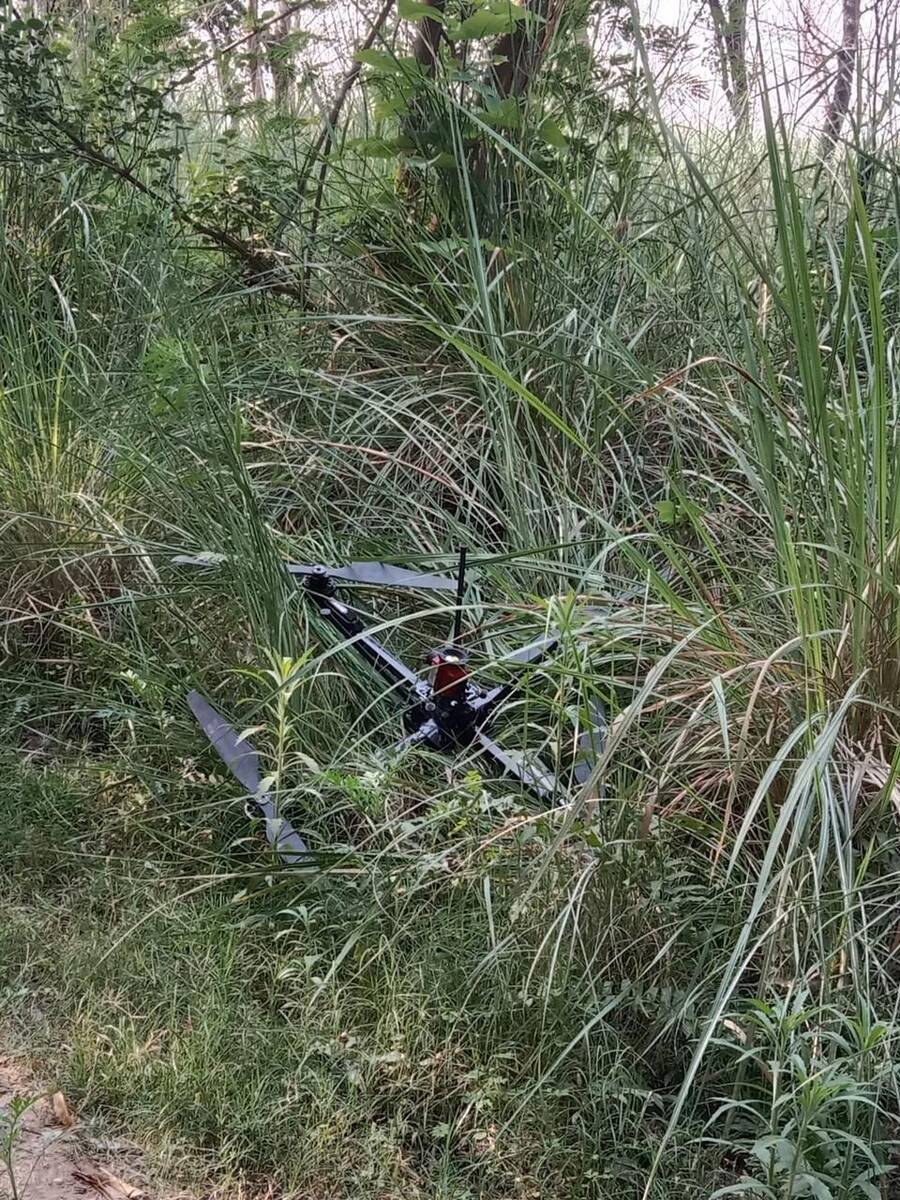
Earlier, Pakistan’s state media, quoting security sources, reported the military had shot down an Indian quadcopter attempting reconnaissance along the LoC, calling the action a testament to Pakistan’s defensive preparedness.
Tensions have remained high since the April 22 attack in Pahalgam, with Pakistan’s Defense Minister Khawaja Asif warning on Monday the next few days were “crucial” in view of a possible Indian military incursion.
“The threat is there, there is absolutely no doubt about it,” Asif told Geo TV.
“If any attempt was made to cross our geographical borders or if a war was imposed on us, then we are definitely prepared for that and will give a full response,” he added.
Kashmir, a Himalayan region claimed in full by both India and Pakistan but ruled in parts by each, has been a flashpoint between the two countries since their independence in 1947.
The two sides have fought two of their three wars over the territory.
IMF Executive Board to meet on May 9 to review Pakistan’s loan programs

- IMF board’s approval of staff-level agreement with Pakistan will pave the way for disbursement of $1 billion
- Islamabad also secured a new loan program with IMF in March to help build resistance against natural disasters
KARACHI: The International Monetary Fund’s (IMF) Executive Board will meet on May 9 to review its staff-level agreement with Pakistan for an ongoing $7bn bailout program and a new climate resilience loan scheme with Islamabad, the global lender said on its website recently.
The IMF reached a staff-level agreement with Pakistan in March on the first review of the country’s Extended Fund Facility (EFF) and a new $1.3 billion loan arrangement under the Resilience and Sustainability Facility (RSF). Pakistan secured the EFF program last year and deems it crucial to escape a prolonged economic crisis. The staff-level agreement, once approved by the IMF Executive Board, will pave the way for an immediate disbursement of about $1 billion for Pakistan.
The RSF, on the other hand, will support Pakistan’s efforts in building resilience to natural disasters, enhancing budget and investment planning to promote climate adaptation, improve the efficient and productive use of water. It will also help in strengthening Pakistan’s climate information architecture to improve the disclosure of climate risks and align energy sector reforms with mitigation targets.
“May 9, 2025, Pakistan-first review under the extended arrangement under the Extended Fund Facility, request for Modification of Performance Criteria, and request for an arrangement under the Resilience and Sustainability Facility,” the IMF wrote on its website on Friday, disclosing its Executive Board’s schedule.
Pakistan has been prone to natural disasters and consistently ranks among the most severely affected countries in the world due to climate change effects. Unusually heavy rains and melting of glaciers in 2022 triggered flash floods across the country, killing over 1,700 people and inflicting losses over $33 billion.
The IMF program has played a key role in stabilizing Pakistan’s battered economy, which has made some gains in recent months, most notably a reduced inflation rate. The government has said the country is on course for a long-term recovery, while Finance Minister Muhammad Aurangzeb has vowed Islamabad will continue to implement financial reforms mandated by the international lender.
Pakistan secured the $7 billion loan program in September 2024 as it attempted to consolidate its economy since averting a default in 2023. Islamabad has since undertaken several reforms to reduce public debt, maintain low inflation, improve energy sector viability, and accelerate growth.
Pakistan hopes to achieve further economic progress by increasing its exports and attracting foreign investment from regional allies, particularly the Gulf countries. Islamabad has signed memoranda of association (MoUs) regarding trade and investment worth billions of dollars with Saudi Arabia, the United Arab Emirates, Azerbaijan, China and other countries in recent months.


